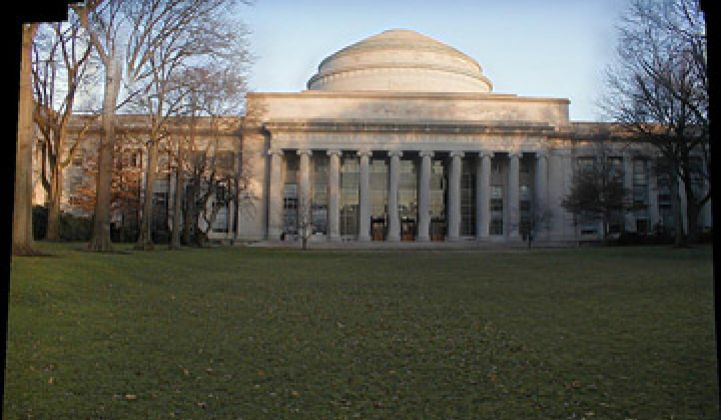Forget the Oscars. For student entrepreneurs, the MIT Clean Energy Prize is the most watched show in town -- literally. This year, MIT broadcast the competition’s proceedings to viewing sites worldwide.
The student-run competition awards a $200,000 grand prize to the premier greentech business plan nationwide. Previous winners include FloDesign (2008), FastCap (2009) and C3Nano (2010). Since its inception, MIT Clean Energy Prize participants have gone on to raise more than $88 million.
Eighty teams from more than 50 universities participated in this year’s contest. The following five teams were selected finalists. Next week, one will be judged the grand prize winner.
Ubiquitous Energy
A renewable energy startup, Ubiquitous Energy hopes to commercialize organic solar cells that can be deposited on paper, textile and other surfaces.
“We transform any surface into a renewable source of solar energy,” said Ubiquitous Energy’s Miles Barr. “We deposit paper-thin, lightweight, flexible solar cells that […] conform to the roughness of fibrous paper or textiles.”
“Organic PV is a hot topic in academic labs. We are unique in the surface materials we can access,” continued Barr. “Our first product [will] target the emerging needs of off-grid communities, specifically the million[s] of mobile phone users who don’t have access to electricity.”
Ubiquitous Energy’s solar cells are 200 nanometers thick. They are currently only one percent efficient, though the company aims to develop cells that are five percent efficient.
“We are not trying to beat the world record for efficiency, but we are trying to be effective in integrating into everyday products,” said Barr. “Because you can put [our cells] on ordinary paper or textiles as opposed to [just] a sheet of glass or smooth plastic, it is more aesthetic. [...] Think about integrating [solar] into clothing, window curtains, and magazines.”
The finalist for the “clean non-renewables” category, PK Clean aims to turn landfill plastics into oil through a patented catalytic depolymerization process that it is now testing in a 20-ton-per-day pilot facility.
“Our first target market is the metal recycling industry,” said Priyanka Bakaya. “For our metal recycling customers, PK Clean will slash their waste disposal fees from $50 to $10 a ton. Simultaneously, we will sell the renewable fuel to refineries.”
An energy efficiency company, CoolChip aims to improve data center energy efficiency by breaking down the “thermal brick wall.”
“We have DARPA-funded, patented technology from MIT and a national lab in the Midwest that can disrupt [a] market segment that has been stagnant. Our heat sink technology promises to provide a 10x improvement in data center cooling,” said CoolChip’s William Sanchez. “We have market validation and delivered prototypes to the military in December.”
A transportation play, Made in the Commonwealth aims to refine synthetic, ultra-low sulfur renewable jet fuel for Boston’s Logan International Airport.
“We are using off-the-shelf technology that has been de-risked by UOP Honeywell, the GE of refining technology,” said Made in the Commonwealth’s Matthew Pearlson. “We hope to raise $20 million in the next six months to produce over 30 million gallons [of jet fuel] a year.”
LinkCycle
The “deployment” category finalist, LinkCycle, aims to improve carbon footprinting for industrial products.
“We are bringing life cycle assessment to an online, collaborative environment,” said LinkCycle’s Alex Loijos. “This enables costs to come down and [the product to be] put into the hands of small- and medium-sized businesses.”
Audience members at the MIT Clean Energy Prize Innovation Showcase selected one of the 25 semifinalists for a people’s choice award.
Zolar Chiller
“We have a portable, rechargeable solar refrigerator that uses no electricity, no fuel and has no emissions,” said Zolar Chiller’s Matt Thoms. “We are hoping to tackle the vaccine market and from there the refrigeration market.”
Finally, one student company struck me as particularly interesting during the Innovation Showcase.
Smarter Shade (Lono LLC)
“We make windows that can tint from clear to dark with the flip of a switch. [...] Most of the people [pursuing] smart glass are working with electrochromics or other electrochemical processes, because if you studied and know optics, that seems to make the most sense. But it is a very complicated and cutting-edge technology,” said Smarter Shade’s Will McLeod. “We took a step back and… developed a much simpler and much cheaper solution.”
“The basic idea is [that] if you were to take a polarizer and a[nother] polarizer, [then] rotat[e] that [second] polarizer, you would go from letting light through to blocking it,” continued McLeod. “We came up with a way to take that rotation and make it into a much simpler translation where you just shift [the second polarizer] by a quarter of an inch, and that gives you the clear to dark [crossed polarizer effect] in a way that can fit into a square window.”
Founded at the University of Notre Dame, Smarter Shade has secured a National Science Foundation SBIR grant worth $150,000 and a State of Indiana grant for $75,000. The company recently produced a small two-inch-by-two-inch prototype window [and] ordered its first one-meter-by-one-meter window. Though Smarter Shade’s founders only went full-time in January, they have been working with glass supplier ODL for over a year on prototype development.
“Our cost today, [while] using other people’s excess capacity to build, is $60 per square foot. If we build our own roll-to-roll manufacturing, we can get that cost down to $20 per square foot,” said McLeod.
***
Yoni Cohen is a student at the Yale Law School. A former college basketball reporter for Fox Sports, he tweets about cleantech @Cohen_Yoni.
Photo Credit: Extrudedaluminiu under a Creative Commons license.



